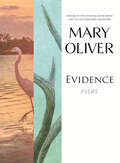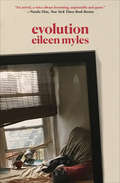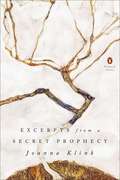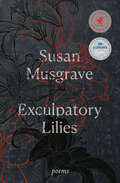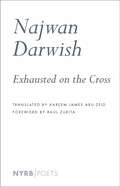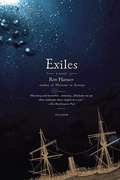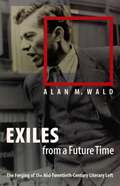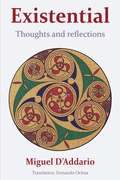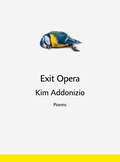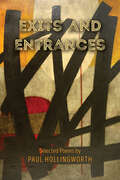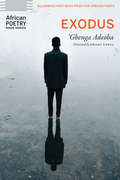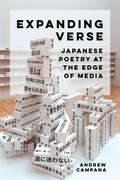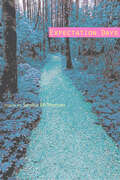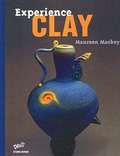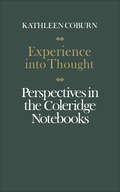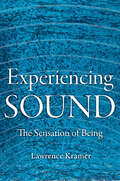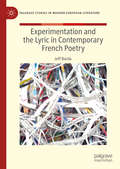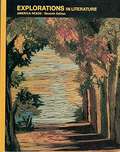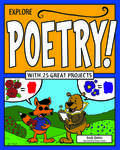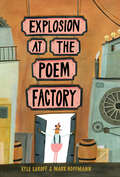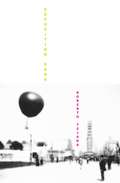- Table View
- List View
Evidence: Poems
by Mary OliverNever afraid to shed the pretense of academic poetry, never shy of letting the power of an image lie in unadorned language, Mary Oliver offers us poems of arresting beauty that reflect on the power of love and the great gifts of the natural world. Inspired by the familiar lines from William Wordsworth, "To me the meanest flower that blows can give / Thoughts that do often lie too deep for tears," she uncovers the evidence presented to us daily by nature, in rivers and stones, willows and field corn, the mockingbird's "embellishments," or the last hours of darkness.
Evidentiality in Sa'dī's Poetry and Prose: A Corpus Stylistic Study (Iranian Studies)
by Behrooz Mahmoodi-Bakhtiari Masoumeh MehrabiThis study is the first to introduce evidentiality to the stylistic analysis of literary works, specifically that of the great Persian writer Sa'dī, focusing on how he used linguistic means to illustrate a real or ideational world. The authors begin by introducing the concept of evidentiality; its definition, its coding in Persian, the rationale behind evidentiality analysis, and semantic-pragmatic functions of evidentiality. The book highlights how evidentiality can be accounted for as a stylistic device to reveal the validity of a narration, as well as the author’s commitment and contribution to it. Three of Sa'dī’s major works are analyzed – Būstān, Golestān and Sonnets – using Krippendoff's frequency approach. It is argued that Sa'dī deployed an array of evidentials in his work, from direct visual evidentials in Golestān and Sonnets to heard and quoted evidentials in Būstān. To illustrate this, the book includes translations of Sa'dī’s poetry and prose. In addition, the authors consider historical and contemporary manifestations of the Persian narrative style, as well as exploring the cultural concerns of the Persian speech community. The book will appeal to general linguists, practitioners of pragmatics and stylistics, literary critics, and those interested in contrastive analysis of literature and cultural studies.
Evolution
by Eileen MylesThe new poetry collection from the award-winning author of Chelsea Girls reads like &“an arrival, a voice always becoming, unpinnable and queer&” (Natalie Diaz, New York Times Book Review). The first all-new collection of poems from Eileen Myles since 2011&’s Snowflake/different streets, Evolution follows the author&’s critically acclaimed Afterglow (a dog memoir), as well as a volume of selected poems, I Must Be Living Twice. In these new poems, we find the eminent, exuberant writer at the forefront of American literature, upending genre in a new vernacular that radiates insight, purpose, and risk while channeling of Quakers, Fresca, and cell phones. This long-awaited new collection &“lopes forward in the strutting style of the witnessing and sincere, but gorgeously nonaustere, poet in New York…The gift of Evolution is its bold depiction of the textually-rendered &‘I&’-Eileen&” (Kenyon Review). A New York Times Book Review Editors&’ Choice
Excerpts from a Secret Prophecy
by Joanna KlinkNew work from an awardwinning poetJoanna Klink has won acclaim for poetry of bracing emotional intensity. Of her most recent book, Raptus, Carolyn Forché has written that she is "a genuine poet, a born poet, and I am in awe of her achievement." The poems in Klink's new collection offer a closely keyed meditation on being alone--on a self fighting its way out of isolation, toward connection with other people and a vanishing world.
Exculpatory Lilies: Poems
by Susan MusgraveFrom the award-winning poet known for her bracing honesty and sharp yet compassionate gaze, here is a new collection of poems that explore life, marriage, addiction, death, and heart-wrenching grief.If grief is the willingness to be claimed by a story bigger than ourselves, Susan Musgrave writes, &“in that / tender wavering, I let grief in.&” "Writing about grief or tragedy is tricky. Hard to meet it at a heart-level without being effusive; hard to meet it at a brain-level without being cold. Hard not to make it about ourselves. Hard to meet it at a visceral level because it can take us out at the knees," wrote author Carrie Mac, responding to the death of Musgrave&’s partner, Stephen Reid, in 2018. Following this traumatic loss, in September 2021 their daughter, Sophie, died of an accidental overdose after a twenty-year struggle with addiction. But to say this is a collection solely about grief would be to miss the whole nature of Musgrave&’s voice and sensibility. Wit is one counterpoint; the natural world is another. The poems share a landscape whose creatures, minutely observed, wild and tame—the winged ones most of all—dance attendance on the helplessness of our brief and mystifying human lives. Throughout Exculpatory Lilies, Musgrave&’s alertness to even the most desolate places makes her personal sorrows astonishingly potent; and her scrutiny of language, and emotions, makes shot silk out of sackcloth and ashes.
Exhausted on the Cross
by Najwan DarwishA much-anticipated follow-up to Nothing More to Lose, this is only the second poetry collection translated into English from a vital voice of Arabic literature.&“We drag histories behind us,&” the Palestinian poet Najwan Darwish writes in Exhausted on the Cross, &“here / where there&’s neither land / nor sky.&” In pared-down lines, brilliantly translated from the Arabic by Kareem James Abu-Zeid, Darwish records what Raúl Zurita describes as &“something immemorial, almost unspeakable&”—a poetry driven by a &“moral imperative&” to be a &“colossal record of violence and, at the same time, the no less colossal record of compassion.&” Darwish&’s poems cross histories, cultures, and geographies, taking us from the grime of modern-day Shatila and the opulence of medieval Baghdad to the gardens of Samarkand and the open-air prison of present-day Gaza. We join the Persian poet Hafez in the conquered city of Shiraz and converse with the Prophet Mohammad in Medina. Poem after poem evokes the humor in the face of despair, the hope in the face of nightmare.
Exiles
by Ron HansenIn December 1875 the steamship Deutschland left Bremen, Germany, bound for America. On board were five nuns, exiled by a ban on religious orders, bound to begin their lives anew in Missouri. Their journey would end when the Deutschland ran aground at the mouth of the Thames and all five drowned. Ron Hansen tells their harrowing story, but also that of the poet and seminarian Gerard Manly Hopkins, and how the shipwreck moved him to write a grand poem, a revelatory work read throughout the world today. Combining a thrilling tragedy at sea, with the seeming shipwreck of Hopkins's own life, "Hansen brilliantly, if soberly, weaves two interrelated story lines into a riveting novel" (BooklistonExiles).
Exiles from a Future Time
by Alan M. WaldWith this book, Alan Wald launches a bold and passionate account of the U.S. Literary Left from the 1920s through the 1960s. Exiles from a Future Time, the first volume of a trilogy, focuses on the forging of a Communist-led literary tradition in the 1930s. Exploring writers' intimate lives and heartfelt political commitments, Wald draws on original research in scores of archives and personal collections of papers; correspondence and interviews with hundreds of writers and their friends and families; and a treasure trove of unpublished memoirs, fiction, and poetry. In fashioning a "humanscape" of the Literary Left, Wald not only reassesses acclaimed authors but also returns to memory dozens of forgotten, talented writers. The authors range from the familiar Mike Gold, Langston Hughes, and Muriel Rukeyser to William Attaway, John Malcolm Brinnin, Stanley Burnshaw, Joy Davidman, Sol Funaroff, Joseph Freeman, Alfred Hayes, Eugene Clay Holmes, V. J. Jerome, Ruth Lechlitner, and Frances Winwar.Focusing on the formation of the tradition and the organization of the Cultural Left, Wald investigates the "elective affinity" of its avant-garde poets, the "Afro-cosmopolitanism" of its Black radical literary movement, and the uneasy negotiation between feminist concerns and class identity among its women writers.
Existential, thoughts and reflections
by Miguel D'AddarioCompilation of writings and reflections form diverse themes and existential subjects. These are thoughts that take to analysis and observation of the words. A summary of texts that will make us see an alternative road of the usually written before. To think and meditate.
Exit Opera: Poems
by Kim AddonizioA new volume by acclaimed poet Kim Addonizio, whose work is known for its streetwise, unflinching explorations of love, lust, and mortality. Set in locations from dive bars to Montparnasse Cemetery, from an ancient Greek temple to a tourist shop in Assisi, Exit Opera explores the ever-vexing issues of time, mortality, love, and loss, and considers the roles of art and human connection. Whatever their nominal subject—jazz, zombies, Buddhism, Siberian tigers—these poems make for a compelling mix of humor and pain, difficulty and solace. In a nod to Keats, one of the many fellow travelers in these poems, Addonizio invites us to “[inscribe] a few verses on whatever water / you can find” and assures readers that they are not alone in navigating the challenges and changes of mortal life. As she writes in “My Opera”: The staging is difficult. Exploding stars are involved, high-redshift galaxies, interior chambers, a little country blues, a little jazz guitar, a jam jar containing a tiny ocean & a tinier rowboat rocking gently in the swells that I am steering toward you in the dark.
Exits and Entrances: Selected Poems
by Paul HollingworthExits and Entrances is a selection of poems, spanning four decades, by Paul Hollingworth. Hollingworth incorporates different styles from lyricism, elegy, and rap influences to enhance a resonant statement on varied subjects such as birth and loss, psychosis, redemption, technology, the financial sector, social disorder, and a favourite film or song. Location is important to his work. Hollingworth takes the reader on a journey to the high Andes of Peru and Chile, to Glasgow, to Canvey Estuary, and to a family home in Andalucia.
Exodus (African Poetry Book)
by ‘Gbenga AdeobaWinner of the Sillerman First Book Prize for African Poetry, &‘Gbenga Adeoba&’s collection Exodus focuses on forms of migration due to the slave trade, war, natural disasters, and economic opportunities. Using the sea as a source of language and metaphor, Adeoba explores themes of memory, transition, and the intersections between the historic and the imagined. With great tenderness and power his poetry of empathy searches for meaning in sharply constructed images, creating scenes of making and unmaking while he investigates experiences of exile and displacement across time and place.
Expanding Verse: Japanese Poetry at the Edge of Media (New Interventions in Japanese Studies #6)
by Andrew CampanaA free ebook version of this title is available through Luminos, University of California Press's Open Access publishing program. Visit www.luminosoa.org to learn more.Expanding Verse explores experimental poetic practice at key moments of transition in Japan's media landscape from the 1920s to the present. Andrew Campana centers hybrid poetic forms in modern and contemporary Japan—many of which have never been examined in detail before—including the cinepoem, the tape recorder poem, the protest performance poem, the music video poem, the online sign language poem, and the augmented reality poem. Drawing together approaches from literary, media, and disability studies, he contends that poetry actively aimed to disrupt the norms of media in each era. For the poets in Expanding Verse, poetry was not a medium in and of itself but a way to push back against what new media technologies crystallized and perpetuated. Their aim was to challenge dominant conceptions of embodiment and sensation, as well as who counts as a poet and what counts as poetry. Over and over, poetic practice became a way to think about each medium otherwise, and to find new possibilities at the edge of media.
Expectation Days (Illinois Poetry Series)
by Sandra McPhersonFrom movie making to medical misadventures, meditations on widowhood to feminist protestations, Expectation Days is a dazzling portrayal of instances in Sandra McPherson’s life. Her autobiographical collection uses peculiar and exact language to reflect on a wide range of activities that include grouse hunting, going through airport security after 9/11, and climbing a coastal cliff. From being an unintended child to ceremonializing a lifetime “served,” McPherson speaks in both clear and distressing voices from the state of speechless fear that is bereavement. Will the little figures ever reach the monument? A doctor orders me to be on watch. Will the mist pass over their cheeks and clear the strollers’ eyes? If so, I’ll see it. I’m on watch. I train my eyes on paintings to see if there is any change. --from “On Suicide Watch”
Experience Clay
by Maureen MackeyLEVEL: 6th form onwards. This contemporary guide to clay techniques, tools, and traditions is as inspirational as it is practical. Supported by a clear, step-by-step illustrations, this comprehensive resource details a range of hand building and wheel throwing techniques. From the properties of clay to decoration and firing, all information presented is shown against a rich backdrop of dynamic professional and student work. While encouraging students of varying abilities to explore their own unique style and interests, basic to advanced studio opportunities highlight teaching tips and safety notes at point of use. Friendly and definitive, this stimulating guide to clay is ideal as an introductory text for a studio course from Art I to Ceramics IV. The student text explores ancient traditions and historic innovations. It also includes carefully crafted lessons organised for success in creating art and mastering key concepts and skills while introducing students to: Contemporary masters; Cutting-edge works of art; New media; Techniques and safety precautions; Current careers in art.
Experience Clay
by Maureen MackeyLEVEL: 6th form onwards. This contemporary guide to clay techniques, tools, and traditions is as inspirational as it is practical. Supported by a clear, step-by-step illustrations, this comprehensive resource details a range of hand building and wheel throwing techniques. From the properties of clay to decoration and firing, all information presented is shown against a rich backdrop of dynamic professional and student work. While encouraging students of varying abilities to explore their own unique style and interests, basic to advanced studio opportunities highlight teaching tips and safety notes at point of use. Friendly and definitive, this stimulating guide to clay is ideal as an introductory text for a studio course from Art I to Ceramics IV. The student text explores ancient traditions and historic innovations. It also includes carefully crafted lessons organised for success in creating art and mastering key concepts and skills while introducing students to: Contemporary masters; Cutting-edge works of art; New media; Techniques and safety precautions; Current careers in art.
Experience into Thought: Perspectives in the Coleridge Notebooks
by Kathleen CoburnColeridge is admired as a genius and derided as an opium addict and plagiarist. The aim here has been to examine his experiences, moods, thoughts, and reactions as a whole and their relation to poems such as Christabel, the Ancient Mariner, and the Dejection ode, and to his prose works, and also to look at many of his own statements made mainly in the privacy of his notebooks about his aims and purposes. The result of the new compound should alter some of the uninformed and prejudiced generalizations about Coleridge. The new picture is of a man and poet more human, more inquiring, more sceptical, whose strength and intellectual stature can fully be understood only against a background of suffering and loneliness; a critical, radical imagination is seen not only struggling to survive but to achieve creatively in the process.One of the world's pre-eminent Coleridge scholars, Kathleen Coburn brings a long association with and intimate knowledge of Coleridge's writings, both published and unpublished, to this sensitive study of a complex mind and personality.
Experiencing Sound: The Sensation of Being
by Lawrence KramerFrom the winds of Mars to a baby's first laugh, a prolific philosopher-composer reflects on the profound imperative of sound in everyday life. Experiencing Sound presents its subject as fundamental to all experience—sensation, perception, and understanding. Lawrence Kramer turns on its head the widespread notion that vision takes pride of place among the senses and demonstrates how paying attention to sound can transform how we make meaning out of experience. Through a series of brief, lyrical forays, Kramer shows that sound, whether heard or unheard, is the object of a primary need and an essential component in the sensation of being alive and the perception of time. It is something that we may suffer—or be made to suffer—as well as enjoy. Like its predecessor The Hum of the World, this book ranges widely across music, philosophy, literature, art, media, and history, from classical antiquity to the present, as it invites us to experience sound anew.
Experimentation and the Lyric in Contemporary French Poetry: Poetry On The Edge (Palgrave Studies in Modern European Literature)
by Jeff BardaExperimentation and the Lyric in Contemporary French Poetry offers a new theoretical approach and historical perspective on the remarkable upsurge in creative poetic practices in France that have challenged traditional definitions of poetry and of the lyric. Focusing on the work of Pierre Alferi, Olivier Cadiot, Emmanuel Hocquard, Franck Leibovici, Anne Portugal and Denis Roche, this book provides an analysis of the most influential poets in French poetry of the last few decades. It contextualizes the theoretical models that inform their investigations, analyzing them alongside the history of the avant-garde and the heated theoretical debates that have taken place over whether to continue or bring an end to the lyric. Systematically addressing the various strategies employed by these poets and drawing on reception theory and cognitive studies, Jeff Barda argues that French radical poetics re-evaluates the lyric in cognitive terms beyond the personal. This book is essential reading for anyone interested in twenty-first-century forms of experimental writing and the connections between literature and the arts today.
Explorations in Literature (America Reads)
by Ruth S. Cohen Raymond J. Rodrigues Nancy MillettExplorations in Literature presents a compilation of stories, poems, and essays from different authors and genres grouped by theme to create critical thinking skills. In addition to teaching literary terms, the questions in the book develop the students' abilities to respond to literature.
Explorations in Literature (America Reads) Classic Edition
by Nancy C. Millett Raymond J. Rodrigues'Explorations in Literature' has six units containing short stories, poetry, plays, and nonfiction. A seventh unit is made up of Greek myths. The eighth unit consists of a novel, The Call of the Wild.
Explore Poetry!
by Andi DiehnPoems can be silly, serious, or fun, just like kids! Whether it’s the sing-song rhythm of a limerick, the serendipitous magic of a found poem, the deceptive simplicity of a haiku, or the easy familiarity of an acrostic poem, children are charmed by poetry. And what’s more fun than reading poetry? Writing it! In Explore Poetry! With 25 Great Projects children have fun learning about different forms of poetry while delving into different literary techniques such as personification, metaphor, and alliteration, all of which are discussed in a simple and accessible way. Activities include creative writing exercises designed to reinforce language arts skills, plus art projects that encourage children to visualize concepts and definitions. Short biographies of important poets reinforce the concept of poetry as an important part of society. Explore Poetry! meets Common Core State Standards for language arts; Guided Reading Levels and Lexile measurements indicate grade level and text complexity. Informational and inspiring, Explore Poetry! fits seamlessly into the poetry curriculum of grades 2 to 4 and serves as an enrichment resource all during the school year, especially April, Poetry Month.
Explosion at the Poem Factory
by Kyle LukoffA funny story, full of wordplay, brings poetry alive as never before! Kilmer Watts makes his living teaching piano lessons, but when automatic pianos arrive in town, he realizes he’s out of a job. He spots a “Help Wanted” sign at the poem factory and decides to investigate — he’s always been curious about how poems are made. The foreman explains that machines and assembly lines are used for poetry these days. So Kilmer learns how to operate the “meter meter” and empty the “cliché bins.” He assembles a poem by picking out a rhyme scheme, sprinkling in some similes and adding alliteration. But one day the machines malfunction, and there is a dramatic explosion at the poem factory. How will poetry ever survive? Kyle Lukoff’s funny story, rich in wordplay, is complemented by Mark Hoffmann’s lively, quirky art. The backmatter includes definitions of poetic feet, types of poems (with illustrated examples) and a glossary of other terms. An author’s note explains the inspiration for the story. Key Text Features definitions glossary author's note Correlates to the Common Core State Standards in English Language Arts: CCSS.ELA-LITERACY.RL.2.4 Describe how words and phrases (e.g., regular beats, alliteration, rhymes, repeated lines) supply rhythm and meaning in a story, poem, or song.
Exposition Park (The Driftless Series)
by Roberto TejadaImagine a walking tour of stanzas and prose poems that give lyric voice to sight, public speech, and spectacle. In Exhibition Park, Roberto Tejada delivers a command performance in mixed genres that compel an array of literary styles. His poetry undertakes a wide range of subjects motivated by artworks from Latin America and the United States covering the colonial period to the present day. In serial poems, short sketches, guidebook parodies, painterly triptychs, translations, and other word-based dioramas, Tejada coins wonder with historical styles--baroque, classic, and experimental. As likened to a world's fair, the resulting voices intone global stories, the dream life of art, and first-person atmospheres both premodern and postindustrial. "Tejada's work is with dismantling borders and upsetting classifications... The result is a layered poetry that finds its form in dense stanzas composed of lines that frequently veer toward a kind of fractured prose..."--Alan Gilbert in Another Future: Poetry and Modern Art in a Postmodern Twilight"You walk through his world as a voyeur, a traveler of mirrors, witnessing your own reflection in the masses of flesh, simultaneously aroused and disturbed at the same time. Tejada's work is an invitation, a window into another world, unabashedly erotic, and succinct."--Christine Lark Fox, Poetry Project Newsletter, about Mirrors for Gold
Expounding the Doubtful Points
by Wing T. LumThis collection of poems discusses the author's Chinese-American heritage. Themes present include: ancestral ties to China, living family members in Hawaii and ugly stereotyping.
